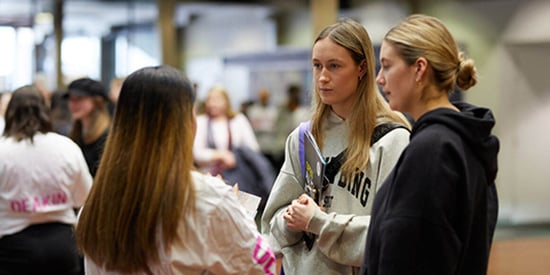Key facts
Duration
1 year full-time or part-time equivalent duration. Please see the Pathways section below for more information.
Locations
Current Deakin Students
To access your official course details for the year you started your degree, please visit the handbook
Course overview
Grow your professional identity and develop advanced strategic communication skills by studying the Graduate Diploma of Public Relations. Work on industry-based projects and promotional plans that prepare you to be an adaptable public relations practitioner in a changing communications environment.
Ready to upskill into a leadership role in the public relations industry?
To thrive in a changing industry, you will need to develop new skills and new ways of thinking. The Graduate Diploma of Public Relations prepares you for the changing demands of employers and clients by combining traditional skills, such as writing, collaboration and project and campaign planning, with training in fundamental areas of public relations, such as crisis communications, digital communication and social media. Professionally accredited and designed in close consultation with industry, the course reflects current practice trends while setting you up for sustained career growth in an evolving landscape.
From strategy development and public relations writing to reputation and issues management, you will develop the practical skills to tackle the diverse challenges of the role. Through authentic, real-world assessment tasks like developing public relations campaigns, you will enhance your ability to influence behaviours, beliefs and attitudes through strategic communications across a broad range of channels.
Internships and work-integrated learning opportunities allow you to build even more practical experience. Work on briefs for real clients and discover what it takes to deliver campaigns to a deadline, while managing stakeholder expectations and dealing with unexpected events. Through these experiences, you will grow your professional identity and form valuable networks with other bright minds in the field.
The course also exposes you to the theories and models at work behind public relations practice, allowing you to critically analyse in-market campaigns and better understand the social, cultural and ethical implications of public relations activities.
While there are many exciting career pathways for graduates, there are also opportunities for further study upon successful completion of the course. If you want to continue building your expertise, you might like to articulate into Deakin’s Master of Communication.
Read MoreCourse information
- Award granted
- Graduate Diploma of Public Relations
- Year
2024 course information
- Deakin code
- A643
- Level
- Postgraduate (Graduate Certificate and Graduate Diploma)
- Australian Qualifications Framework (AQF) recognition
The award conferred upon completion is recognised in the Australian Qualifications Framework at Level 8.
Course structure
To qualify for the award of Graduate Diploma of Public Relations, students must successfully complete:
- 6 credit points in Public Relations from the units listed below, plus
- 2 credit points of electives, plus
- DAI001 Academic Integrity Module (0-credit-point compulsory unit)
6
Core public relations units
2
Elective units
8
Total
Core Units
Electives
Electives may be chosen from the remaining units above or from any other postgraduate course in the School of Communication and Creative Arts. Students who intend to move from the Graduate Diploma into the Master of Communication are strongly advised to take ACX701Communication Concepts for their two elective credit points.
Intakes by location
The availability of a course varies across locations and intakes. This means that a course offered in Trimester 1 may not be offered in the same location for Trimester 2 or 3. Check each intake for up-to-date information on when and where you can commence your studies.
Trimester 1 - March
- Start date: March
- Available at:
- Online
Trimester 2 - July
- Start date: July
- Available at:
- Online
Additional course information
Course duration
Course duration may be affected by delays in completing course requirements, such as accessing or completing work placements.
Mandatory student checks
Any unit which contains work integrated learning, a community placement or interaction with the community may require a police check, Working with Children Check or other check.
Participation requirements
Reasonable adjustments to participation and other course requirements will be made for students with a disability. More information available at Disability support services.
Work experience
Elective units may provide the opportunity for Work Integrated Learning experiences.
Entry requirements
Selection is based on a holistic consideration of your academic merit, work experience, likelihood of success, availability of places, participation requirements, regulatory requirements, and individual circumstances. You will need to meet the minimum academic and English language proficiency requirements to be considered for selection, but this does not guarantee admission.
Academic requirements
To be considered for admission to this degree you will need to meet at least one of the following criteria:
- completion of a bachelor degree or higher
- at least two years' relevant work experience (or part-time equivalent)
English language proficiency requirements
To meet the English language proficiency requirements of this course, you will need to demonstrate at least one of the following:
- bachelor degree from a recognised English-speaking country
- IELTS overall score of 6.5 (with no band score less than 6.0) or equivalent
- other evidence of English language proficiency (learn more about other ways to satisfy the requirements)
Admissions information
Learn more about Deakin courses and how we compare to other universities when it comes to the quality of our teaching and learning.
Not sure if you can get into Deakin postgraduate study? Postgraduate study doesn’t have to be a balancing act; we provide flexible course entry and exit options based on your desired career outcomes and the time you are able to commit to your study.
Recognition of prior learning
The University aims to provide students with as much credit as possible for approved prior study or informal learning which exceeds the normal entrance requirements for the course and is within the constraints of the course regulations. Students are required to complete a minimum of one-third of the course at Deakin University, or four credit points, whichever is the greater. In the case of certificates, including graduate certificates, a minimum of two credit points within the course must be completed at Deakin.
You can also refer to the Recognition of prior learning system which outlines the credit that may be granted towards a Deakin University degree.
Fees and scholarships
Fee information
Learn more about fees and your options for paying.
The 'Estimated tuition fee' is provided as a guide only based on a typical enrolment of students completing this course in the same year they started. The cost will vary depending on the units you choose, your study load, the length of your course and any approved Recognition of prior learning. One year full-time study load is typically represented by eight credit points of study. Each unit you enrol in has a credit point value.
The 'Estimated tuition fee' is calculated by adding together eight credit points of a typical combination of units for your course.
You can find the credit point value of each unit under the Unit Description by searching for the unit in the Handbook.
Learn more about tuition fees.
Scholarship options
A Deakin scholarship might change your life. If you've got something special to offer Deakin – or you just need the financial help to get you here – we may have a scholarship opportunity for you.
Postgraduate bursary
If you’re a Deakin alumnus commencing a postgraduate award course, you may be eligible to receive a 10% reduction per unit on your enrolment fees.
Apply now
Applications can be made directly to the University through StudyLink Connect - Deakin University's International Student Application Service. For information on the application process and closing dates, see the How to apply web page.
Fill out the application form and submit to a Deakin International office or take your application form to a Deakin representative for assistance
For information on the application process and closing dates, see the How to apply webpage.
If you’re still having problems, please contact Deakin International for assistance.
Entry pathways
A shorter course duration is available to students entering from a same discipline background. A 'same discipline' background award for this course is any tagged Bachelor degree (min 3 years) or Bachelor degree (min 3 years) with a major sequence in Public Relations, Professional Communication or Public Affairs.
| Highest same discipline award held at point of Grad Dip entry | Reduction in course duration | Remaining course duration |
| Bachelor, Bachelor (Honours) same discipline | 0.5 year (4 credit points) | 0.5 year or part-time equivalent (4 credit points) |
Alternative exits
Careers
Career outcomes
This course is designed to equip graduates with the knowledge, skills and understanding to obtain challenging positions in the expanding field of public relations.
Promising career opportunities exist for public relations professionals in industry and commerce, government, community and education institutions, hospitals, health and welfare organisations, special interest groups, cultural organisations consumer affairs and public relations consultancies.
Professional recognition
Students enrolled in the Graduate Diploma of Public Relations are eligible for course-accredited membership of the Public Relations Institute of Australia (PRIA).
Course learning outcomes
Deakin's graduate learning outcomes describe the knowledge and capabilities graduates can demonstrate at the completion of their course. These outcomes mean that regardless of the Deakin course you undertake, you can rest assured your degree will teach you the skills and professional attributes that employers value. They'll set you up to learn and work effectively in the future.
| Deakin Graduate Learning Outcomes | Course Learning Outcomes |
| Discipline-specific knowledge and capabilities | Analyse and critically evaluate theoretical approaches and issues relevant to public relations practice in the local, national and global context, including current social and legal norms, policies, and practices. |
| Communication | Effectively communicate analyses, findings and strategies in public relations to a range of audiences using written, digital and oral formats. |
| Digital literacy | Identify and utilise a range of generic digital communication technologies and specific digital technologies employed by public relations professionals to address communication needs for diverse audiences and to deliver reports and presentations to audiences within and outside the public relations field. |
| Critical thinking | Analyse and critically evaluate theoretical approaches to public relations practice and contemporary public relations strategies and tactics. |
| Problem solving | Employ specialised knowledge, initiative and creativity in conjunction with evidence-based communication methods to generate innovative approaches and solutions to complex, real-world issues within the professional public relations environment. Acquire expertise in the formulation, design, implementation and evaluation of public relations strategies and tactics. |
| Self-management | Act with autonomy, responsibility, accountability and a continued commitment to learning and skills development in the field of public relations. |
| Teamwork | Work and learn collaboratively in the field of public relations with colleagues and real-world (external) clients and others from different disciplines and backgrounds while still maintaining responsibility for your own learning. |
| Analyse and address communication issues in a domestic and global context as a reflective scholar and practitioner, taking into consideration cultural and socio-economic diversity, social and environmental responsibility, and the application of the highest ethical standards. | |
| Approved by Faculty Board November 2022 | |




